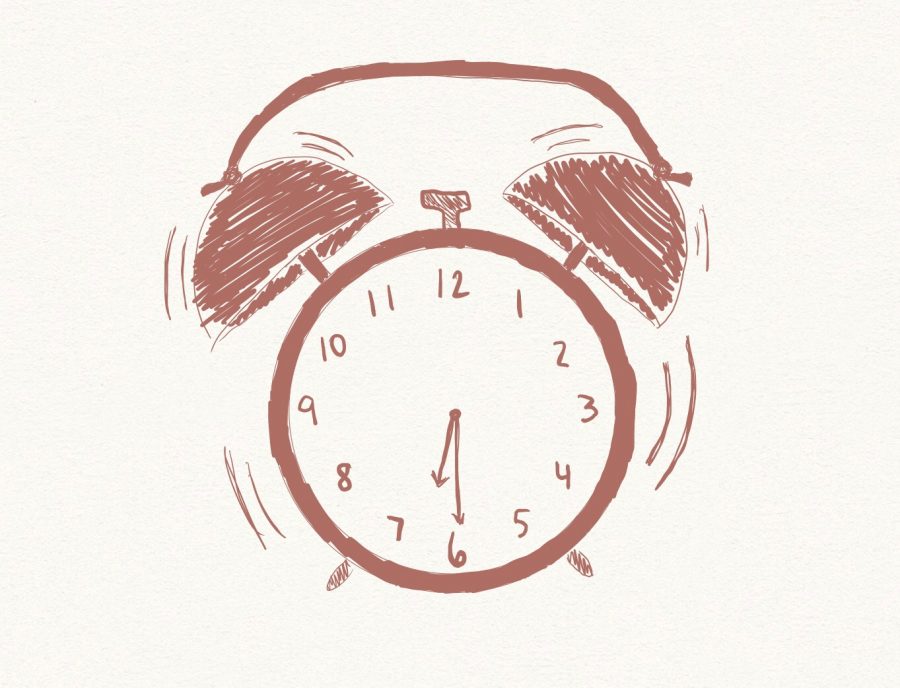Schuster Steps In to Standardize Sleep-In
Since Latin’s return to in-person learning, many students including myself have experienced a significant change in their sleeping habits. “I sometimes find myself drifting off during my first class of the day,” sophomore Cecilia Whitted said.
As a student who participates in sports and other extracurricular activities, I often find myself struggling to balance my schoolwork with my daily routine. As a result of usually not getting home until after 6 p.m., I typically get around seven hours of sleep after doing all my classwork, leaving me tired throughout the day and inhibiting my performance in school. However, when I have a sleep-in, I feel more energized and focused in class. We should start school later so students can perform better every day, not just on days when they have a free in the morning.
Not getting enough sleep is a common issue among many high school students and is something that can be improved by school starting later in the day. The School Health Policies and Practices Study has shown that more sleep improves concentration, productivity, and cognition—all necessary elements in excelling academically and athletically.
According to the Office of Disease Prevention and Health Promotion, it is recommended for teenagers to get around eight to 10 hours of sleep each night. While achieving an optimal amount of sleep isn’t realistic for many students participating in outside-of-school activities and athletics, any extra sleep can make a difference in performance across the board. The American Academy of Pediatrics (AAP) has even urged school districts to consider starting school later so that students can get adequate sleep.
Sophomore Charlie Leonard is in favor of changing Latin’s schedule. “School should start later,” he said, “because it gives our brains time to recover and therefore gives us better results in our academic and athletic activities.”
Many students prioritize classwork over sleep, leading to a lack of focus and ability to participate within the classroom. Junior Bri Nourie believes everyone, not only students, would benefit from school being pushed back. “It has been proven that the human brain is less productive earlier in the morning,” Bri said. “Starting school later would give students and teachers extra sleep and the biological advantage of being less tired.”
She suggests removing long blocks, adding, “I often find that during my long blocks in the morning, I focus on staying awake instead of the actual material we are being taught.” Long blocks are not an efficient way to learn because our brains aren’t awake enough to properly absorb new material and give our full attention. The 90-minute block also makes it difficult to stay engaged for the entirety of class.
While the scheduling of our day is quite complicated, many students agree that a later start would be beneficial for all. “A late start would increase productivity and attentiveness during the school day,” sophomore Stella Harris said.
Upper School math teacher Laura Ilkhchi has a slightly different perspective. As a teacher, she believes that long blocks are not as academically efficient as they seem. She said, “You can’t double up on content for 90 minutes. Instead, you are just introducing the same content while giving more practice time.”
She believes it would be more efficient and convenient to have a later start and replace the long block with a regular 50-minute class block. Students would have the option to come in early from 8 to 9 a.m. and meet with teachers if they can’t meet during the day or after school. “The late starts could serve as built in student-teacher time,” Ms. Ilkchi said, “because 50-minute blocks are more than enough time to cover material.”
Other schools have taken action on this issue. The University of Chicago Laboratory High School has recently reached out to parents, students, faculty, and administrators to form a team dedicated to exploring the possibility of a later start time. According to a report by senior Colin Leslie in the U-High Midway, altering their schedule has been a point of conversation at Lab, although the idea of a later start time is a fairly new one.
While I am a fan of the current schedule, as it gives me late starts at least once a week, many students who take seven classes do not have this privilege. If you have a full schedule of seven or even eight classes, you get only one late start per eight-day cycle, essentially once every other week. While having a universal later start time could potentially lead to later dismissal, that is something that I am willing to sacrifice. Being able to stay productive and engaged during school would be worth the 30-minute to one hour later dismissal, in my opinion. During remote schooling, however, our schedule was moved back to start all classes at 9 a.m. as we did not have a long block, but our school day did not run any later than usual due to asynchronous classes. I think it would be interesting to explore the idea of replacing our long block with an asynchronous class or potentially getting rid of long blocks altogether. Times have changed since then, but many students and faculty believe the school should look into implementing more late starts or get rid of long blocks altogether.




















































